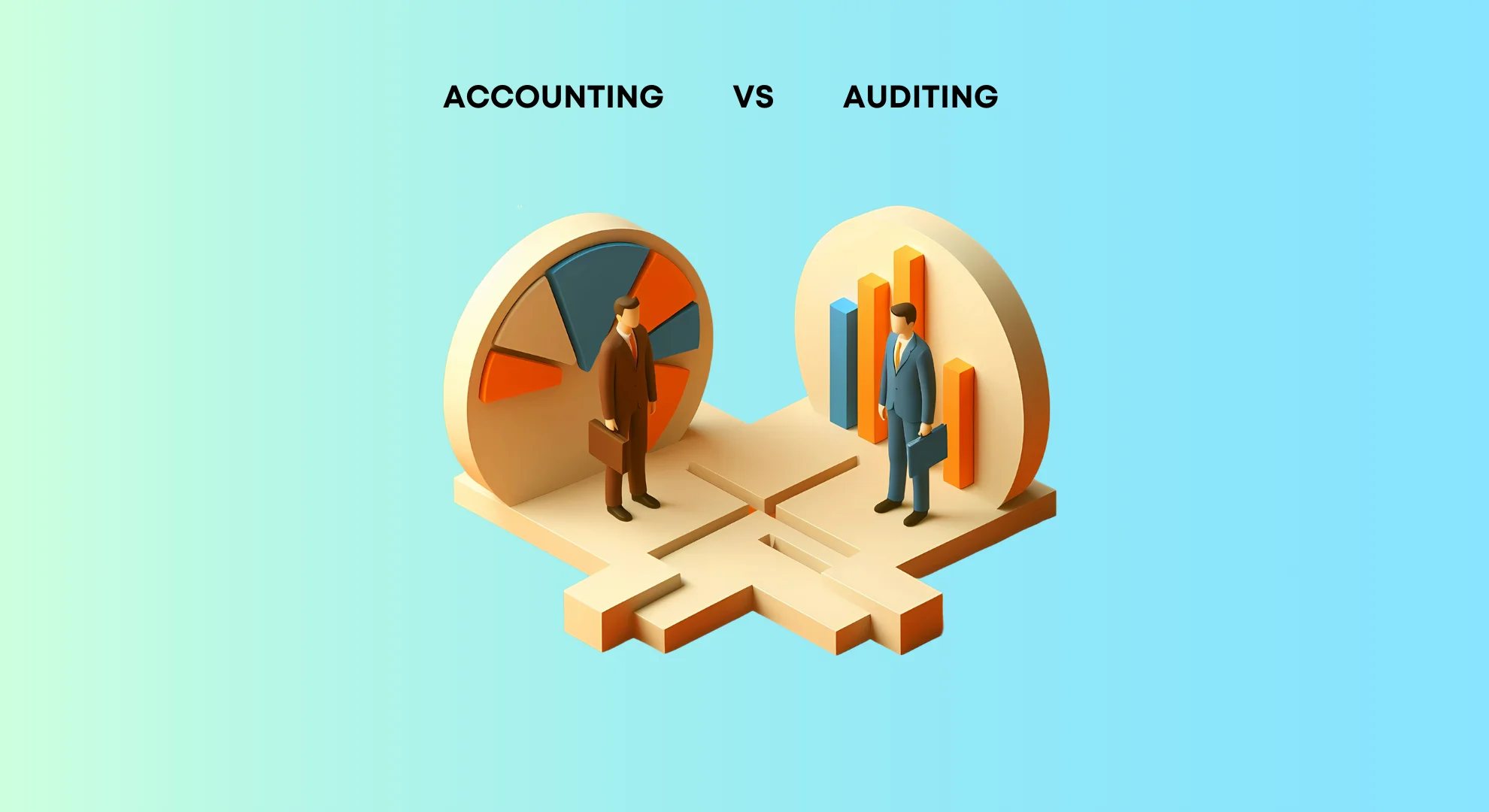Within the financial landscape, accounting and auditing play critical roles in maintaining transparency and ensuring the accuracy of financial information. While both disciplines are essential for a healthy economic ecosystem, they serve distinct purposes and require unique skill sets. Understanding the difference between accounting and auditing helps businesses make informed financial decisions.
Table of Contents
What is Accounting?
Effective financial management relies on accurate accounting for financial planning, decision-making, and analysis. It encompasses the systematic recording, classification, analysis, and reporting of financial transactions. Accounting professionals meticulously track a company’s economic activities, ensuring the accuracy and completeness of its financial records. Key responsibilities of accountants include:
- Maintaining general and subsidiary ledgers: These record a company’s financial transactions, categorized by type.
- Processing accounts payable and accounts receivable: Accounts payable represent a company’s debts, while accounts receivable represent the money owed to the company by its customers.
- Preparing payroll and tax records: Ensuring accurate calculation and timely payment of salaries and taxes for employees.
- Reconciling bank statements: Comparing bank statements with internal records to identify and rectify discrepancies.
- Generating financial statements: The income, balance, and cash flow statements provide a complete overview of a company’s financial performance and position.
- Assisting with budgeting and forecasting activities: Developing realistic financial projections for future operations.
What is Auditing?
Auditing is an independent examination of a company’s financial statements by a qualified professional, typically a Certified Public Accountant (CPA). The main objective of an auditor is to assess the accuracy and fairness of a company’s financial statements and provide an opinion on whether they truly represent the company’s financial position and performance by Generally Accepted Accounting Principles (GAAP) or other relevant accounting standards. The audit process typically involves:
- Reviewing internal controls: Evaluating a company’s systems and procedures to safeguard assets and ensure financial reporting integrity.
- Performing substantive testing: Selecting a sample of financial transactions and performing detailed analyses to verify their accuracy and completeness.
- Preparing an audit report: This report outlines the auditor’s findings and expresses an opinion on the fairness of the financial statements. The four primary categories of audit opinions are unqualified (also known as clean), qualified, adverse, and disclaimer of opinion.
Accounting vs Auditing: Key Differences
While accounting and auditing work in tandem to ensure financial well-being, some key distinctions exist:
- Focus: Accounting focuses on the day-to-day recording and reporting of financial transactions, while auditing focuses on the independent assessment of the financial statements prepared by accountants.
- Perspective: Accountants act as internal partners, maintaining financial records and providing financial insights to management. Auditors act as independent third parties, objectively assessing a company’s financial health for the benefit of stakeholders.
- Time Horizon: Accounting deals with historical financial data (past and present transactions) while auditing primarily focuses on the accuracy of financial statements for a specific period. However, auditors may also consider potential future impacts on a company’s financial position.
- Level of Detail: Accounting professionals delve into the meticulous recording of every financial transaction. Auditors perform a high-level review, focusing on material risks and significant economic activities.
- Regulations: Accountants primarily adhere to GAAP or other relevant accounting standards. Auditors also consider professional auditing standards established by the Public Company Accounting Oversight Board (PCAOB) or other regulatory bodies.

How to Become an Accountant vs. Auditor
The educational and licensing requirements for accountants and auditors differ:
- Accountant: Individuals pursuing accounting careers typically need a degree in accounting or a related field. A bachelor’s degree generally is necessary to pursue a career in accounting. Certifications like Certified Public Accountant (CPA), Certified Management Accountant (CMA), or Certified Internal Auditor (CIA) might only be necessary for some accounting jobs. Still, some employers may favor candidates who have them.
- Auditor: To become an auditor, an individual must have completed a four-year undergraduate program in accounting or a related field of study. Most importantly, individuals must obtain a CPA license, which involves passing the Uniform CPA Examination, meeting work experience requirements, and adhering to continuing education mandates.
Accounting vs Auditing: What do they do?
Accountants and auditors perform distinct but complementary roles:
Accountant:
- Maintains financial records according to established accounting standards.
- Prepares financial statements for internal management purposes.
- Identifies potential financial risks and opportunities.
- Provides financial analysis and reporting to management.
- May specialize in areas such as tax accounting, financial accounting, or cost accounting.
Auditor:
- Conducts independent examinations of a company’s financial statements.
- Assesses the effectiveness of a company’s internal controls.
- Evaluates the accuracy and completeness of financial transactions.
- Issues an audit report
- Provides recommendations for improving internal controls and financial reporting processes.
- May specialize in different types of audits, such as internal, external, or forensic audits.
Accounting vs Auditing: Similarities
Despite their differences, accountants and auditors share some key similarities:
- Strong Analytical Skills: A sharp attention to detail and the capacity to analyze intricate financial information are essential for both careers.
- Problem-Solving Skills: Accountants and auditors must identify and resolve financial discrepancies.
- Communication Skills: Both occupations require the ability to convey intricate financial information to multiple parties, making effective communication a vital aspect of their work.
- Integrity and Ethics: Ensuring ethical conduct is of utmost importance for accountants and auditors, who are responsible for safeguarding financial data.
The Importance of Both Accounting and Auditing
Both accounting and auditing play vital roles in a healthy financial ecosystem:
- Accounting provides the foundation: Accurate and reliable financial records compiled by accountants are essential for conducting business operations, making informed decisions, and preparing for audits.
- Auditing ensures transparency: Assuring stakeholders, including investors, creditors, and regulators, about the accuracy and fairness of a company’s financial statements is crucial, and independent audits play a significant role in achieving that. These audits are essential in providing stakeholders with confidence in the company’s financial statements.
Choosing Between a Career in Accounting or Auditing
The choice between a career in accounting or auditing depends on your individual preferences:
- Accounting may be a good fit if you enjoy detail-oriented work and maintaining accurate financial records. Accounting offers a broader range of career paths, with opportunities in both private and public sectors.
- If you prefer a more investigative role and value independent objectivity, a career in auditing may be appealing. Auditing careers often involve travel and deadlines, and they can lead to specialization in specific industries or audit types.

Conclusion
Accounting and auditing are two pillars of a sound financial system. Accountants meticulously record and report financial transactions, while auditors independently assess the accuracy and fairness of financial statements. Understanding these distinct functions empowers businesses to develop robust financial management practices and ensure transparency to stakeholders.










